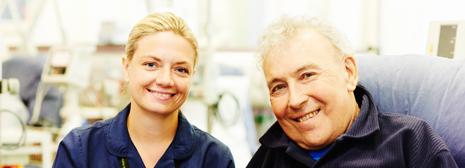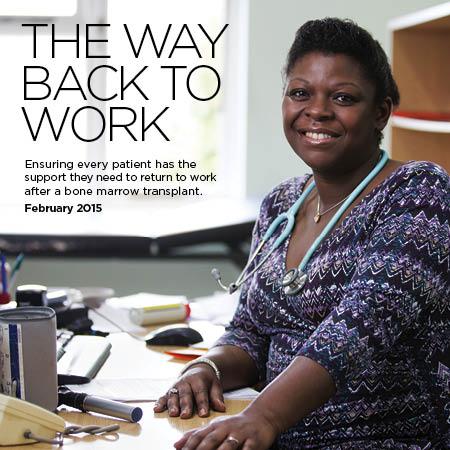Returning to work can help cancer patients with their recovery from bone marrow (or stem cell) transplants, our new report has revealed.
Going back to work can give patients a feeling that they are returning to normality and can improve well-being and quality of life, agrees Anthony Nolan’s first ever post-transplant nurse, who has called on clinicians to consider returning to work as a key patient outcome.
The report highlights the importance of offering support to patients and employers to make the return to work as easy and comfortable as possible.
It specifically mentions the importance of advising employers to offer phased returns to works and flexible hours.
Hayley Leonard, Anthony Nolan’s Post-Transplant Clinical Nurse Specialist at The Royal Marsden Hospital, said: “Clinicians need to be aware that going back to work is very important to many patients and should be a key outcome in their recovery after cancer.
“It is about regaining a sense of purpose and getting back to normality. As healthcare professionals, we need to be aware of that and to help them get the support and advice they need. We need also to talk to employers and to advise them about how to assist their employees as they return to work.”
Hayley, who was appointed as Anthony Nolan’s first post-transplant nurse last summer, added: “As long as it is safe, we need to encourage people to go back to work, as long as they do it slowly. This is because it can help their recovery by giving them the motivation to get up and be active.”
'The Way Back to Work' report
The report is the latest initiative from Anthony Nolan as the charity increasingly focuses on survivorship issues and supporting patients through their whole transplant journey.
It revealed that many patients struggle with ‘invisible’ symptoms like fatigue and difficulty concentrating when they return to work.
Some 87 per cent of survey respondents reported feeling tired when they first went back and 65 per cent said they had difficulty concentrating.
They generally agreed that a return to work is much easier if employers are supportive and have a good understanding of their limitations and the possible hidden side-effects of their treatment.
As a result, Hayley suggests that it can help patients if their doctor or nurse explains the long-term effects of their treatment when contacting their employer at the time of their return to work.
She said: “Giving employers information can be very helpful – they need to know how long it can take for a patient to recover from their treatment so that they can be sympathetic to that.”
She added that, while it is important to help patients return to work, it is also important to prepare them for the possibility of having to take further time off if they become unwell and for the fact that they may have to return to a less prestigious or demanding role than that which they left before their illness.
She said: “Some patients will never get back to work full time and it can be hard, especially for young people who were going to do very well and suddenly find themselves in less well paid and prestigious jobs than they anticipated.”
Henny Braund, Chief Executive at Anthony Nolan, commented: “For post-transplant patients, going back to work is a key milestone. It represents a return to normality, a chance to feel useful again, and an opportunity to focus on something aside from recovery. Returning to work is a key part of an active lifestyle, and it’s been associated with improved general wellbeing and a higher quality of life.
“Unfortunately, the journey back to employment is rarely simple for those who are dealing with the physical and psychological impact of a transplant as we discovered from the findings of this report. Patients told us that it is vital that employers offer phased returns to work and that they are aware of, and sympathetic to, some of the difficulties that patients can experience even once their formal treatment has ended.
“At Anthony Nolan we will continue to develop the existing support we offer at every stage of the transplant journey.”

